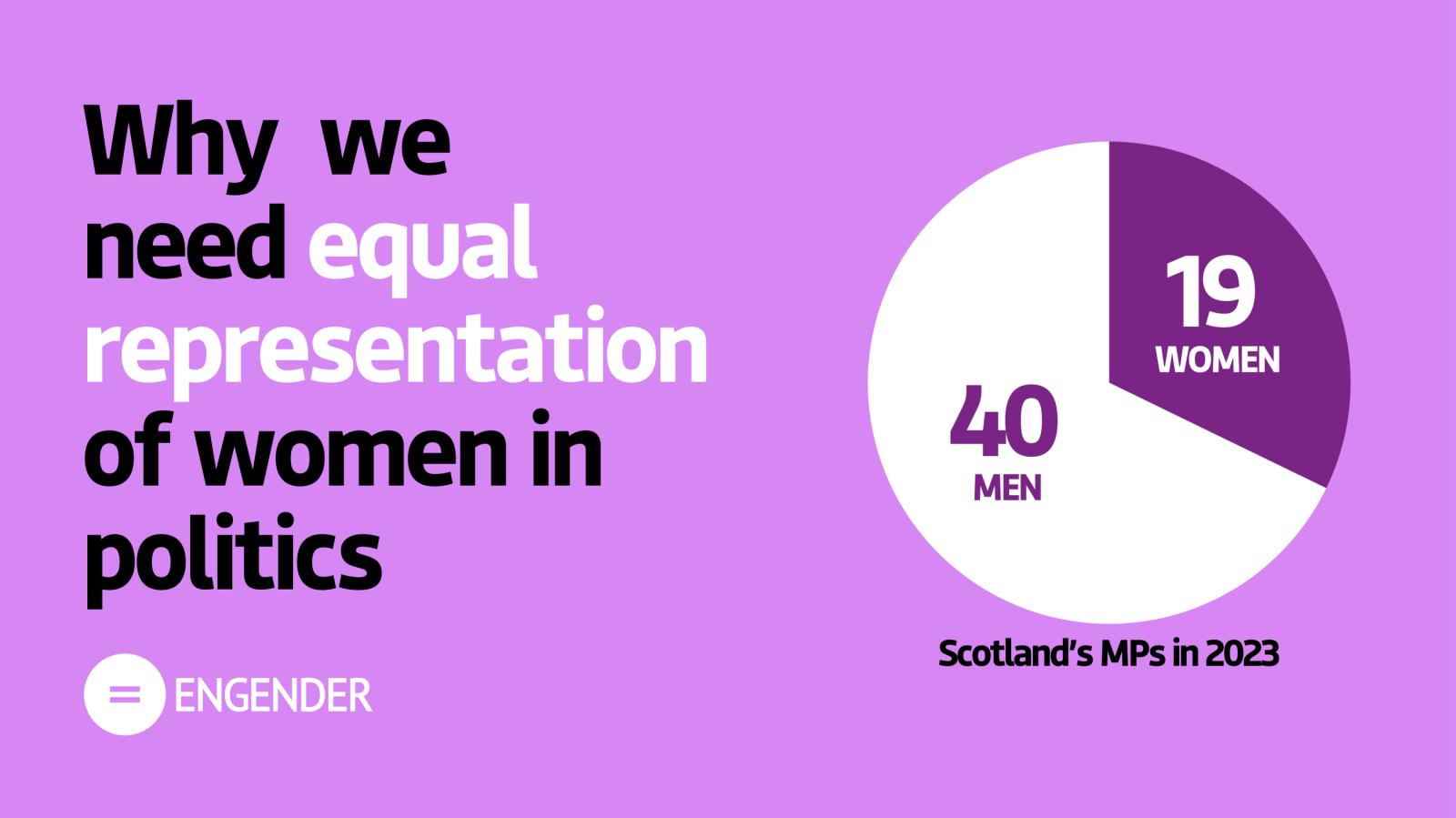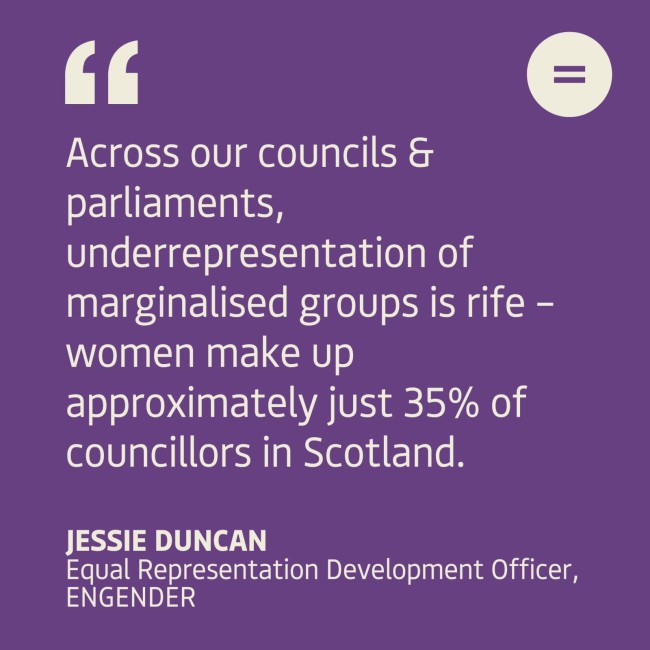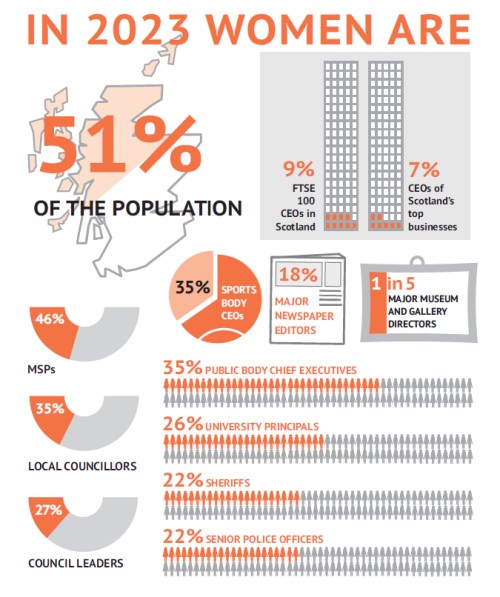Engender blog
General Election 2024 - Why we need equal representation of women in politics
We’re calling on candidates in the upcoming General Election to commit to taking action on four key areas for women if elected.
In our What’s in it for women? four-part series, we’ll break down each of our key asks covering health, social security, equal representation and immigration.
Today, we’ll focus on equal representation and why we’re calling for action on quotas and better data collection about our candidates.
Find and email your local candidates with our pre-written letter here.

General Election 2024?– What’s in it for women??
Email your local candidates with our pre-written letter here
In a few clicks, contact your local candidates to ask what they will do for women's rights in Scotland.
- Find your local candidates by searching your postcode below
- On the next page, edit and send the campaign letter
We’re calling on candidates to commit to taking action on four key areas for women if elected – and we need your help.
 Political decision-making affects women’s daily lives, yet there is a significant void in women’s representation and distribution of power in Scotland. We advocate for a Scotland where women are part of every political and economic decision, both as decision-makers and as citizens who are affected by the consequences of these decisions.
Political decision-making affects women’s daily lives, yet there is a significant void in women’s representation and distribution of power in Scotland. We advocate for a Scotland where women are part of every political and economic decision, both as decision-makers and as citizens who are affected by the consequences of these decisions.
A decade of austerity policies, the pandemic, and the ongoing cost of living crisis have all impacted women disproportionately. Issues like fuel costs, unpaid care, housing, women’s safety, mental health and social security continue to impact the most marginalised women.
The General Election on 4th July is an opportunity for the next UK Government to prioritise women’s rights and equality.
We need change to make women’s voices heard.
Before the Ballot - Why Candidate Assessment is a crucial step on the journey to more equal representation in politics
With partners in the Equal Representation Coalition, Engender is launching a brand new chapter of the Equal Representation in Politics Toolkit focusing on Candidate Assessment. Ahead of the Scottish Parliament and Local Council elections in 2026 and 2027, now is the time for parties to review how aspiring candidates gain approval to stand if we're to see more diversity on the ballot. Our Development Officer for Equal Representation, Jessie Duncan, explains how the new Toolkit chapter can help.

Before the ballot
When we think about how to make councils and parliaments more representative of the communities they serve, we normally think about elections. How do we elect more women, more minority ethnic people, more disabled people and more LGBTI people? The ultimate decision about who makes it off the ballot and into our councils and parliaments, of course, rests with voters. But in reality, so much about elections is already decided long before polling day. Parties largely have control over who makes it onto the ballot, with many decisions taken in the months and years leading up to election day, shaping the outcome before any votes have been cast.
Parties decide who becomes a candidate through the process of candidate selection. Selection is where the party decides on who from a list of nominees will become the party candidate at the upcoming election. There is a lot of evidence showing the positive impact that using different policies, such as voluntary quotas during selection, can have on the diversity of elected representatives. However this is only useful if there is a diverse pool of potential candidates available to choose from.
Candidate assessment and discrimination
Not just anyone is allowed to put themselves forward for selection - aspiring candidates will usually have to gain the party's approval. This process is known as candidate assessment (sometimes called vetting, screening or shortlisting), and it is at this stage that the first decisions about who our elected representatives will be are taken. Processes vary but usually involve some combination of written application form, an interview with a panel , and might include a test before a final decision is made. Some parties might use these stages to filter, and just like any recruitment process, without consideration of how to combat discrimination and to ensure equal access, candidate assessment risks stifling a more equal, representative politics right at the outset.
Chronic underepresentation – It's not good enough
Unfortunately, no robust data that would tell us about the protected characteristics of our elected representatives is published at the moment, but what we do know tells us that across our councils and parliaments, underrepresentation of marginalised groups is rife – for instance, women make up approximately just 35% of councillors in Scotland, and it took until 2021 for the first two women of colour to be elected to the Scottish Parliament. This kind of chronic underrepresentation benefits no one – we know that when there is meaningful diverse representation, better decision-making follows. Parties have a tremendous responsibility to their membership and to the communities they seek to serve to ensure that candidate assessment processes do not enable and reward only those whose experiences and pathways to politics conform to an outdated status quo of what makes a politician – because it's clear that the status quo is broken.
What will help?
While progress on increasing diversity is often focused on electoral outcomes, to ensure that progress at the ballot box is sustainable, it's essential to look at all stages of the journey and to invest in developing a strong, diverse pipeline of future candidates. This means considering how potential candidates are developed, supported and assessed. As well as being a responsibility, this offers parties a huge opportunity to put into practice often-stated principles when it comes to building a fairer, more equal society.
Parties must ask themselves:
-
What qualities and experiences do we want to see more of in public life?
-
Is the way we assess potential candidates perpetuating inequality?
-
Are our values as a party reflected in the candidates that we approve to stand?
-
Are we meeting our legal duties to ensure a fair and open process under the Equality Act?
To help answer these questions, we're launching a new chapter of the Equal Representation Toolkit, focused on Candidate Assessment. The chapter is aimed primarily at party members and staff who are involved in assessing candidates or in designing assessment processes. Guidance is given on how to run an inclusive and accessible candidate assessment approach that enables people from a wider range of backgrounds to succeed. This includes looking at things like how to advertise and raise awareness of the assessment process; providing equalities training for people involved in assessment; valuing diverse experience; and how to provide constructive feedback and ongoing support for unsuccessful applicants.
As with the rest of the Toolkit, users are invited to take a self-assessment quiz and receive a bespoke action plan highlighting areas for reflection and recommendations for improvement. The Toolkit is easy-to-use and each chapter takes no more than 5 minutes. We can also offer workshops and 1-2-1 support – please get in touch with us if you're interested.
While all attention may be focused on campaigning for the General Election, it's essential to remember what comes next. We are currently 2 and 3 years out from the next Holyrood and local council elections, but it is likely that the processes which will shape these results will begin much sooner. Candidate assessment is the first in a chain of decisions that determine who our elected representatives will be. It's up to parties to make sure that hopes for greater equality in our democracy are built on strong foundations – starting with asking who is given the chance to be on the ballot.
Where are the women? Nearly 500 women are ‘missing’ from key positions of power in Scotland
New figures from Engender show that 471 women are ‘missing’ from key positions of power in Scotland.

The report, which examines a range of areas across public life – including politics, health, sport and media – paints a concerning picture. The report identified 3383 positions of power in Scotland, with only 1222 (just over a third) held by women. Men continue to hold two-thirds of positions of power in Scotland and were significantly over-represented in 33 of the 38 areas of public life examined - with only 5 areas demonstrating at least 50% of women in leadership positions. This is despite women making up 51% of Scotland’s population, 49% of its labour market, and girls routinely leaving school with higher levels of educational attainment on average.
Apply now for our Board Pioneer Programme

Want to get involved in feminist governance and see how a board works? Find out more about our pilot Board Pioneer Programme in this blog.
Today we’re opening applications for Engender’s Board Pioneer Programme, a one-year opportunity to develop the skills and experience of someone who is interested in getting involved in feminist governance and finding out how a board works.
Our Board Pioneer will attend Engender’s board meetings over the course of a year, including our AGM, and get the chance to share their knowledge and expertise with our board, as well as building their networks within the women’s movement and contributing to Engender’s work for women’s equality in Scotland.
See the full advert and apply online here
Downloads
 Engender Briefing: Pension Credit Entitlement Changes
From 15 May 2019, new changes will be introduced which will require couples where one partner has reached state pension age and one has not (‘mixed age couples’) to claim universal credit (UC) instead of Pension Credit.
Engender Briefing: Pension Credit Entitlement Changes
From 15 May 2019, new changes will be introduced which will require couples where one partner has reached state pension age and one has not (‘mixed age couples’) to claim universal credit (UC) instead of Pension Credit.
 Engender Parliamentary Briefing: Condemnation of Misogyny, Racism, Harassment and Sexism
Engender welcomes this Scottish Parliament Debate on Condemnation of Misogyny, Racism, Harassment and Sexism and the opportunity to raise awareness of the ways in which women in Scotland’s inequality contributes to gender-based violence.
Engender Parliamentary Briefing: Condemnation of Misogyny, Racism, Harassment and Sexism
Engender welcomes this Scottish Parliament Debate on Condemnation of Misogyny, Racism, Harassment and Sexism and the opportunity to raise awareness of the ways in which women in Scotland’s inequality contributes to gender-based violence.
 Gender Matters in Social Security: Individual Payments of Universal Credit
A paper calling on the Scottish Government to automatically split payments of Universal Credit between couples, once this power is devolved to the Scottish Parliament.
Gender Matters in Social Security: Individual Payments of Universal Credit
A paper calling on the Scottish Government to automatically split payments of Universal Credit between couples, once this power is devolved to the Scottish Parliament.
 Gender Matters Manifesto: Twenty for 2016
This manifesto sets out measures that, with political will, can be taken over the next parliamentary term in pursuit of these goals.
Gender Matters Manifesto: Twenty for 2016
This manifesto sets out measures that, with political will, can be taken over the next parliamentary term in pursuit of these goals.
 Scottish NGO Briefing for UN Special Rapporteur on Violence Against Women
Joint briefing paper for the UN Rapporteur on Violence Against Women.
Scottish NGO Briefing for UN Special Rapporteur on Violence Against Women
Joint briefing paper for the UN Rapporteur on Violence Against Women.

Newsletter
Sign up to receive our newsletter here:
Sign up to our mailing list
Receive key feminist updates direct to your inbox: